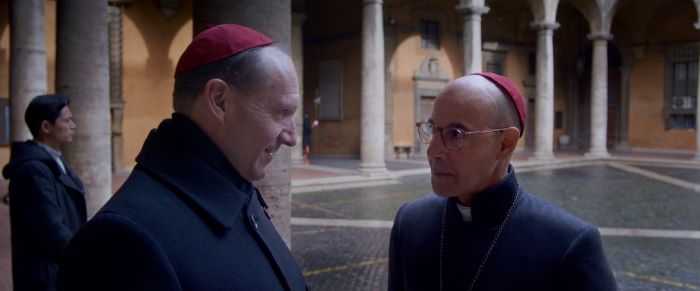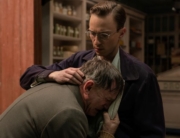With all its complicated history of injustices and scandals—and there are many—even non-Catholics and non-believers aren’t completely immune to the allure the Vatican exerts as the political and spiritual center of the Catholic Church. Conclave is the kind of movie that understands how to instantly captivate viewers: It gives them entrée to where only the imagination usually has access. The new movie by director Edward Berger (All Quiet on the Western Front) is a pure spectacle, upheld by a well-told story with top-notch talent in front of and behind the camera. All transform a clever chamber drama about the fictitious election of a new Pope into a suspenseful ride. (Italy’s Royal Palace of Caserta stands in for Vatican City.)
Based on the 2016 novel by Robert Harris, Peter Straughan’s screenplay contains numerous twists and turns. After the death of an elderly pope, the election of a new leader for the Vatican becomes imminent. Cardinals from various parts of the world gather to decide which of them is most fit to be the next pontiff. Factions quickly form, often divided by language; some share cigarettes in the courtyards; and all must surrender their mobile devices to disconnect from the outside world, ensuring judgments are not swayed by external events. Modernity must be paused to resurrect a certain archaic majesty. A few cardinals waste no time engaging in what, after all, is a form of political campaigning. The one tasked with orchestrating this event with the calmness of a conductor, but also with the cunning of a circus ringmaster, is Cardinal Lawrence (Ralph Fiennes), the dean of the College of Cardinals. Privately, he faces a personal crisis of faith and seeks to use the change in leadership as a chance to finally retire to a monastery.
Several candidates rise as favorites in the early rounds, with occasional wild cards in the mix. Lawrence and a group of progressive cardinals rally their support for Cardinal Bellini (Stanley Tucci), who envisions a shift in Catholicism that includes greater inclusion of women. On the opposite end of the ideological spectrum is Cardinal Tedesco (Sergio Castellitto), a charismatic orator whose appeal is undercut by his anti-Muslim rhetoric. For Lawrence and Bellini, Tedesco is the greater evil to be avoided. Consequently, other popular candidates can be “lesser evil” alternatives: Cardinal Tremblay (John Lithgow) and Cardinal Adeyemi (Lucian Msamati). Two others also receive support: Lawrence—despite having no intention of becoming pope—and newcomer Benítez (Carlos Diehz), a recent appointment by the late pope that the others were unaware of until his introduction at the start of the conclave. Thus unfolds a power struggle worthy of Game of Thrones, with a more subtle yet brutal form of violence that, without spilling any blood, can entirely ruin reputations.
Every candidate gaining momentum becomes a sort of target, and each time a scandal looms around the corner to disqualify them. Lawrence takes on the role of investigator, following clues and exposing sinners, even if it means ensuring Tedesco’s victory. His moral integrity makes him a formidable and intransigent executor of blind justice. Fiennes balances subtlety and theatricality, and the way he carries the film is a reminder of his talent. The other big names in the cast—Tucci, Lithgow, and Isabella Rossellini as Sister Agnes—give more understated performances, but their talents are somewhat underutilized. Nevertheless, Castellitto and Diehz manage to steal some of Fiennes’s thunder. In the best scene, Cardinals Tedesco and Benítez engage in a fierce verbal duel, laying bare an ethical battle.
A little more Da Vinci Code than it should be and less Paolo Sorrentino’s The Young Pope than it could have been, the film’s spell fades slightly when, after it ends, you start to rethink that it appeals more to the heart than the intellect. However, in a year of a U.S. presidential election, it might acquire an extra layer of gravitas for audiences projecting their own ideological concerns onto it. Still, it’s impossible to dismiss the accomplished craft: The masterful balance of light and shadow in Stephanie Fontaine’s cinematography creates some of the most beautiful images you’ll see in theaters this year. (The glossy red of the cardinal robes provides visual delight at every turn.) Volker Bertelmann’s intrusive score keeps your heart racing, ensuring that every revelation has the potential to leave you surprised. Berger ultimately assembles the pieces to artistically elevate what could have easily become a bland potboiler.
The Conclave’s effectiveness as entertainment lies in its freedom to revel in the conjectures and fetishes we continue to nurture about Catholicism. In front of a magnificent cathedral or a beautiful religious painting, we still catch our breath and let our imaginations soar and wonderment engulf us. Both Hollywood and the Vatican have long understood how to harness the sacred mechanics of mystery to remain standing.







Leave A Comment